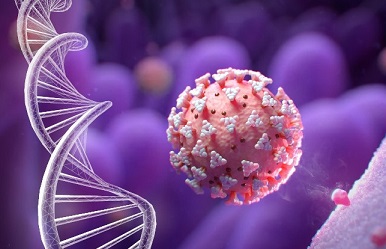COVID-19 News: Omicron Variants Have Accumulated Spike Mutations That Circumvent Host Antiviral BST2 Or Tetherin
Nikhil Prasad Fact checked by:Thailand Medical News Team Jan 20, 2024 1 year, 3 months, 6 days, 3 hours, 23 minutes ago
COVID-19 News: The relentless evolution of the SARS-CoV-2 virus has taken a new turn with the emergence of the Omicron variant, bringing with it a host of questions and challenges for researchers worldwide. A recent study conducted at the University of Rochester Medical Center in New York-USA has delved into the intricate interactions between the virus and the host antiviral factor BST2 (Bone Marrow Stromal Cell Antigen 2), revealing how the Spike mutations in the Omicron variant enable more efficient evasion of host defenses.
 Omicron Variants Have Accumulated Spike Mutations That
Omicron Variants Have Accumulated Spike Mutations That
Circumvent Host Antiviral BST2 Or Tetherin
As the COVID-19 pandemic continues, understanding the nuances of SARS-CoV-2's adaptation mechanisms is crucial for devising effective strategies to combat the virus. This
COVID-19 News report explores the comprehensive findings of the research, shedding light on the molecular intricacies of the Spike-BST2 interaction and the implications for SARS-CoV-2 infectivity and spread.
Methods and Results
The study focused on the interplay between SARS-CoV-2 and the host antiviral factor BST2, also known as Tetherin or CD317 or HM1.24. BST2, induced by type I interferon, serves as a potent restriction factor against enveloped viruses, preventing their release from infected cells. The research revealed that BST2 significantly reduces the release of SARS-CoV-2 virions, emphasizing its role as a crucial component of the host's antiviral arsenal.
However, the virus has evolved sophisticated mechanisms to counteract BST2, with the Spike (S) protein playing a pivotal role in this evasion strategy. The physical interaction between S and BST2 leads to the routing of BST2 for lysosomal degradation in a process dependent on Clathrin and ubiquitination. The study demonstrated that the Omicron variant, among various SARS-CoV-2 variants, excels in counteracting BST2, suggesting an adaptation that enhances its ability to spread efficiently.
Lead author, Dr Yuhang Shi from the Department of Microbiology and Immunology at University of Rochester Medical Center told Thailand
Medical News, “BST2, identified as a membrane protein downregulated by certain viruses, was initially recognized as a potential antiviral factor. Our study underscores BST2's significance as a potent antiviral factor that restricts the release of enveloped viruses, including SARS-CoV-2. The Spike protein of SARS-CoV-2 emerges as the primary player in antagonizing BST2, leading to lysosomal degradation and efficient viral release. Notably, the Omicron variant stands out for its superior ability to counteract BST2, raising questions about the adaptive evolution of SARS-CoV-2 in response to host defenses.”
Dr Shi further added, “Bone marrow stromal antigen 2 (BST2), also known as Tetherin, has been extensively studied as a restriction factor with broad antiviral activity against various enveloped viruses. The study expands on previous knowledge, confirming that BST2 is induced in respon
se to SARS-CoV-2 infection, contributing to a significant reduction in virion release. However, the virus has evolved mechanisms, particularly involving the Spike protein, to overcome this restriction. Coronaviruses, including SARS-CoV-2, encode for structural proteins such as Spike (S), Envelope (E), Membrane (M), Nucleocapsid (N), and, in some cases, Hemagglutinin Esterase (HE). SARS-CoV-2 utilizes the S protein as its key for cellular entry, interacting with the angiotensin-converting enzyme 2 (ACE2) receptor. Following entry, the virus undergoes replication, transcription, and protein synthesis, leading to virion assembly and release.”
The research emphasizes the role of the Spike protein in downregulating BST2, allowing for efficient viral release. Notably, the Omicron variant, among other SARS-CoV-2 variants, exhibits enhanced counteraction of BST2, suggesting a dynamic evolution of the virus. The Spike protein, which has been a focal point for mutations associated with infectivity, transmission, and immune evasion, now emerges as a key player in evading host antiviral defenses.
Future Perspectives
The study delves into the specific mutations in the Spike protein associated with enhanced BST2 counteraction, focusing on the Omicron variant. The research reveals that mutations in the Spike protein of Omicron contribute to its superior ability to downregulate BST2. The study also highlights the need for future investigations into the mechanisms by which Spike mediates the downregulation of BST2, including the roles of ubiquitination and vesicular trafficking.
The enhanced Spike-BST2 association observed in Omicron prompts further questions about the adaptive evolution of the virus. How do these mutations impact the interaction between Spike and BST2? Do they increase the affinity for BST2, augment the avidity for BST2, or enhance the association with an intermediate factor? These questions will guide future experiments to unravel the intricate details of the virus's evasion strategies.
The findings not only provide insights into the adaptation of SARS-CoV-2 but also open avenues for potential therapeutic interventions. Targeting the Spike-BST2 interaction could offer a novel approach to disrupt the virus's ability to counteract host antiviral defenses. As the Omicron variant continues to spread globally, understanding these evasion tactics becomes paramount for developing strategies to mitigate the impact of COVID-19.
Conclusion
In conclusion, the research conducted at the University of Rochester Medical Center offers a comprehensive exploration of the interactions between SARS-CoV-2 and the host antiviral factor BST2. The Omicron variant, with its accumulated spike mutations, exemplifies the virus's adaptability in countering host defenses. Understanding the molecular intricacies of the Spike-BST2 interaction provides a foundation for future studies aimed at developing targeted therapies against SARS-CoV-2 and its variants.
As the scientific community continues to unravel the complexities of the virus, the findings from this study contribute valuable insights into the adaptive evolution of SARS-CoV-2. With the Omicron variant at the forefront of global concerns, deciphering the virus's evasion tactics becomes imperative for devising effective strategies to control the ongoing COVID-19 pandemic.
The study findings were published in the peer reviewed journal: PLOS Pathogens.
https://journals.plos.org/plospathogens/article?id=10.1371/journal.ppat.1011912
For the latest
COVID-19 News, keep on logging to Thailand Medical News.
Read Also:
https://www.thailandmedical.news/news/covid-19-news-study-finds-that-orf3a-and-spike-proteins-subvert-tetherin-a-host-restriction-factor-for-sars-cov-2,-and-promotes-virus-spread
https://www.thailandmedical.news/news/sars-cov-2-research-news-university-of-cambridge-and-nih-led-study-shows-that-sars-cov-2-downregulates-tetherin-which-enhances-its-spread
